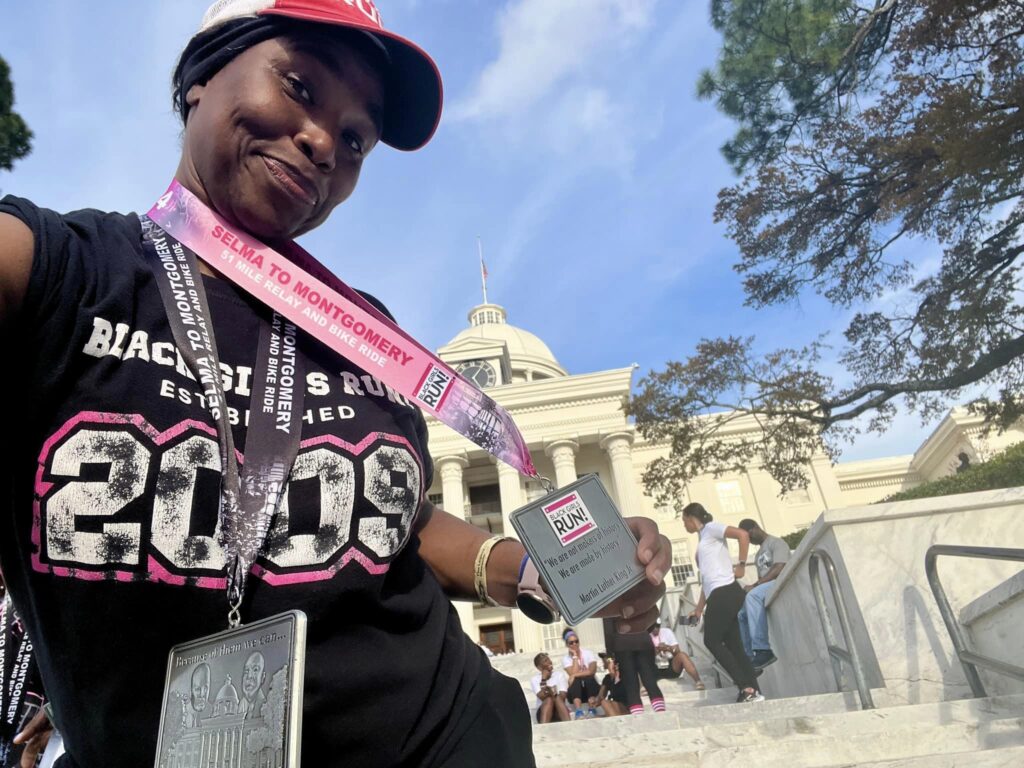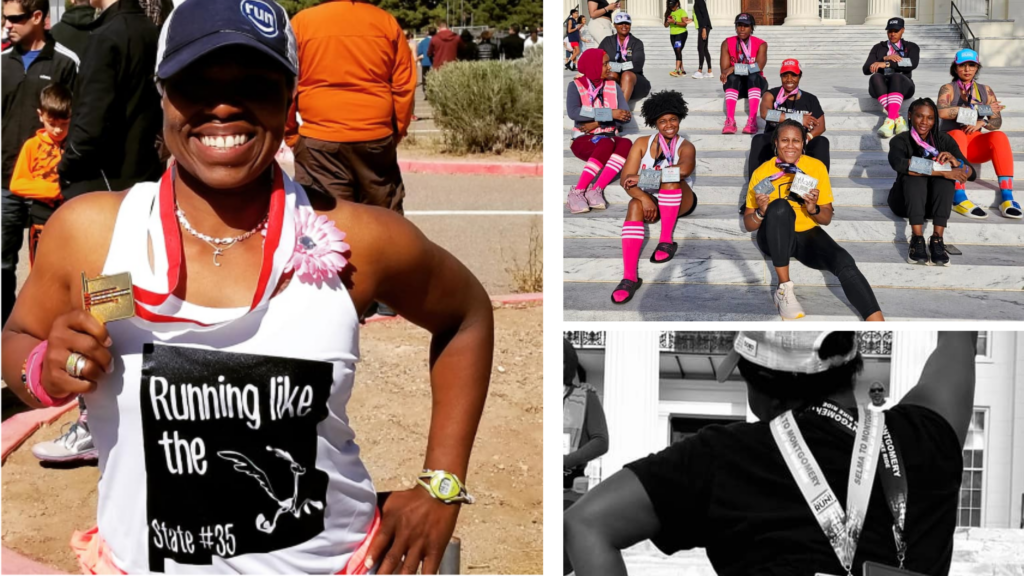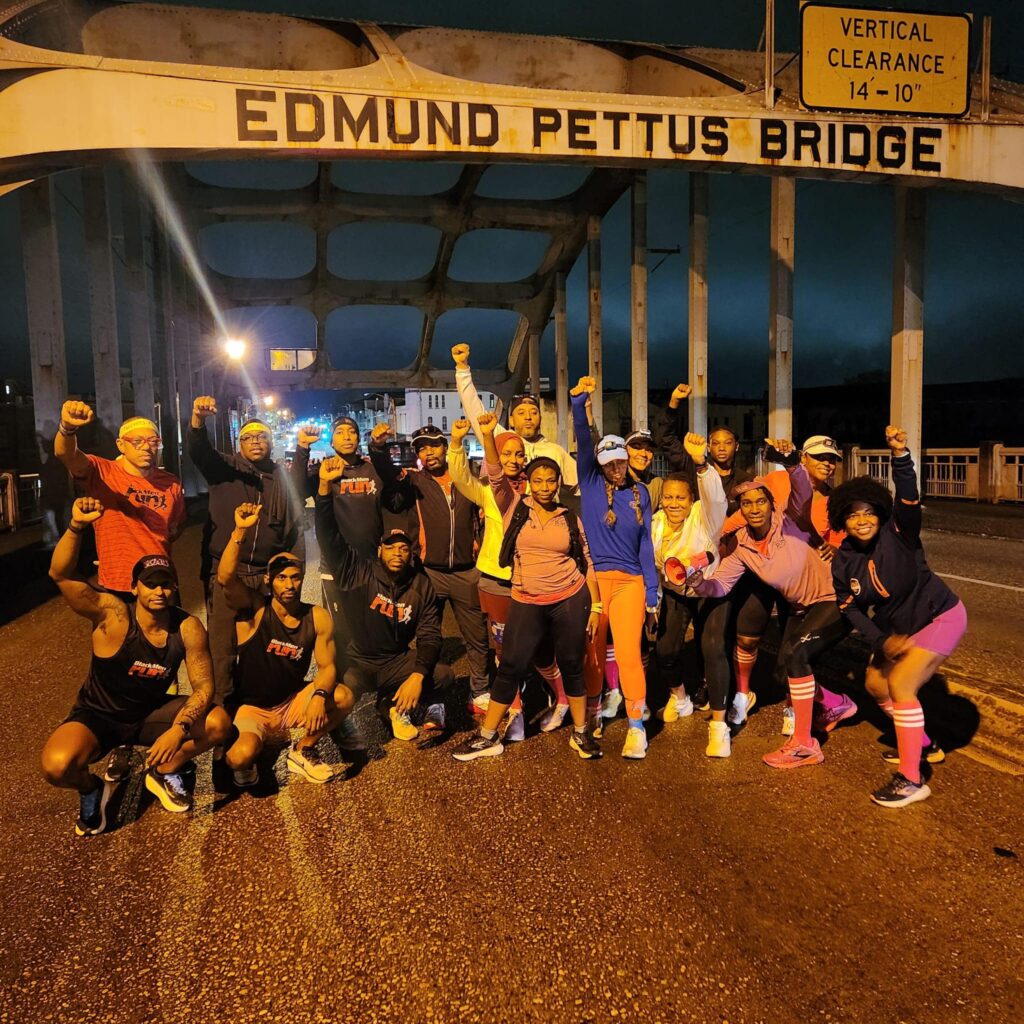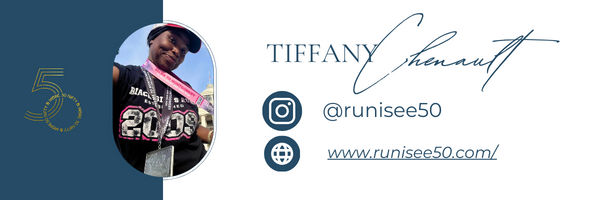
Is running good for women over 50?
Not only could running be good for your health, but it also may help lower your chances of getting certain health problems. With age, you also may naturally slow down and possibly gain weight. Running after 50 could help you control your weight and boost your metabolism, but check with your doctor before starting any exercise program.
Below is an interview with a passionate runner Tiffany Chenault who dedicates her running journey to the memory of her Mother.
Dr. Tiffany Chenault identifies as an African American woman. She is currently a Professor of Sociology at Salem State University. She is a publicly engaged Sociologist who studies social inequalities, race, social justice, and community. She also identifies as a runner. She has recently run a half marathon in each of the 50 U.S. states and encourages other Black women to explore their runner self. This is an interview conducted with Dr. Chenalut’s non-runner friend, Shannon Butler-Mokoro. As this article goes to press, Tiffany just ran a race that is part of the Civil RIghts Race Series. For her 50th birthday (April 30th), she ran a race in Cincinnati, which was a symbolic way for her to enter the next century of her life. Cincinnati is the birthplace of both Tiffany and her mom, so this race is a homecoming and a way to complete her healing and running journey. Tiffany paid homage to her mom by wearing a flower corsage (as she does in every race).
Butler: When I attended your TedTalk back in 2019, I was so amazed at how passionate you are about running. When we first met, we never talked about health or fitness. You are so amazing and I admire your commitment to running and getting Black women to run. How did you get started running and why?
Chenault: I started running because I lost my mother to Cancer. I was deep in grief, but was not fully aware of nor addressing my grief because I was functioning the way Black women often do – just pushing forward with all the things that had to be done. I really didn’t want anyone to know that I was grieving. I was living under the guise of what we stereotype as a strong Black woman. We just hold in our grief and trauma, which truly just re-traumatizes us and does not allow us to heal. I needed to heal, but was not there yet. Then a friend reached out to me to run a race, something I had never done, and it seemed like I had nothing to lose so I said “yes” to running that race. I had never run before, never thought I’d identify as a runner. Once I started running, I felt my grief lifting away, and the more I ran, the more I grieved and felt better. Running is now part of my identity. In the subculture of running, especially around the BIPOC folks and Black women, I found a sense of belonging. When I lost my mom, as an only child, I did not feel like I belonged anywhere. The Black runners welcomed me in; I felt strong, accomplished, and supported. Running with the Black folks, especially the women, is my happy space. Running fuels me; it is part of my self-care. I found my people…well, it took me a while to find my people in the running space, but I did find them!
Butler: How has running helped your overall physical and/or mental health?
Black women have historically and still endure a lot of physical and psychological challenges. Sometimes we just keep moving forward and upward without realizing how burdened and traumatized we are. Initially, I did not realize how much of an outlet running can provide. When I run, I release many of the stressors tied to sexism and racism. Running has boosted my physical and mental health – I feel, and am stronger and whole. Running confirms that I can do anything! I also have a feeling as if I am reclaiming our place in the outdoors, in nature, and in every state in the U.S. This is our land, we belong in all of the spaces! Also, since I’ve immersed myself in the Black girl running world. I have seen women of all ages, shapes, and sizes running. It is empowering. When I turned 30, I did 30 things. Same with 40, and my aim before I turned 50 was to run in all 50 states. Now at almost 50, I want to run five half-marathons. I celebrate all month long and I have already started – I just participated in a 51 mile relay in Selma, Alabama. I want to encourage Black women to find their place in the running space. You can build your own space with your family and friends. You can also use social media to find a Black Girls Run, Outdoor Afro, or Girl Trek groups near you.

Butler: The other thing that I love about your running story and journey is that you have seen so much of the country – every state in the U.S.! I know that there was lots of joy in seeing the country, but also some moments of apprehension and fear. Tell me about that.
Chenault: There is often this false narrative that Black people do not indulge in the outdoors. Running throughout the entire country has helped me reclaim the beautiful fact that we have always been engaged with the land. Running really ignited my Sociological curiosity – I had lots of questions about who I did not see in the running spaces, especially since I started in New England, which is primarily white. I did not see many images of Black women running. I wanted to know where the Black women who I knew must be running were, so I decided to travel the country. I am an avid traveler, so this seemed like a no-brainer. For context, I was running between 2005-2023. I ran during some very tumultuous social & political times – Say Her Name, Black Lives Matter, MAGA, book banning, overturning of Roe vs. Wade – I entered some very white spaces during these years. I was not sure how I would navigate that, especially since I traveled alone to these spaces. On my journey to find the other Black women running, I entered those spaces – Idaho and the Dakotas were some of the whitest and most uncomfortable spaces. I was very leery of going to Idaho because of the hate groups that are known to be active there. The scary moments and discomfort aside, I got to see so many amazing historical places.
Butler: The other thing that I love about your running story and journey is that you have seen so much of the country – every state in the U.S.! I know that there was lots of joy in seeing the country, but also some moments of apprehension and fear. Tell me about that.
Chenault: There is often this false narrative that Black people do not indulge in the outdoors. Running throughout the entire country has helped me reclaim the beautiful fact that we have always been engaged with the land. Running really ignited my Sociological curiosity – I had lots of questions about who I did not see in the running spaces, especially since I started in New England which is so white. I did not see many images of Black women running. I wanted to know where the Black women who I knew must be running, so I decided to travel the country. I am an avid traveler so this seemed like a no-brainer. For context, I was running between 2005-2023. I ran during some very tumultuous social & political times – Say Her Name, Black Lives Matter, MAGA, book banning, overturning of Roe vs. Wade – I entered some very white spaces during these years. I was not sure how I would navigate that, especially since I traveled alone to these spaces. On my journey to find the other Black women running I entered some very white spaces – Idaho and the Dakots were some of the whitest and most uncomfortable spaces. I was very leery of going to Idaho because of the hate groups that are known to be active there. The scary moments and discomfort aside, I got to see so many amazing historical places.

Butler: I am looking forward to you completing your book and sharing with the wider sisterhood about your journey and welcoming in new Black girl runners. Any other advice you have for Black women who are Fifty Nifty?
Chenault: Yes, my book is all about my journey with a mix of some academic highlights. I am working to redefine what it means to be a strong Black woman running. I want to assure Black women, especially those over 50 (or near 50) that we belong in the running space also. It is not just for white folks. The space has historically been constructed as a space of privilege. When you do not see representation you feel like you do not belong. There are many groups for you to join.
To see or hear more about Dr. Cheanulat and her running journey, you can hear her interview with WGBH and go to her website runisee50.com. And to find an organization of Black runners you may want to check out Girl Trek and or Black Girls Run to find your running tribe.

Looove it sis❤️❤️❤️❤️❤️ yes! Congratulations. Your story inspired me. Last year when i read about it. You are amazing. I just completed my 6 star now on my journey 50 States.